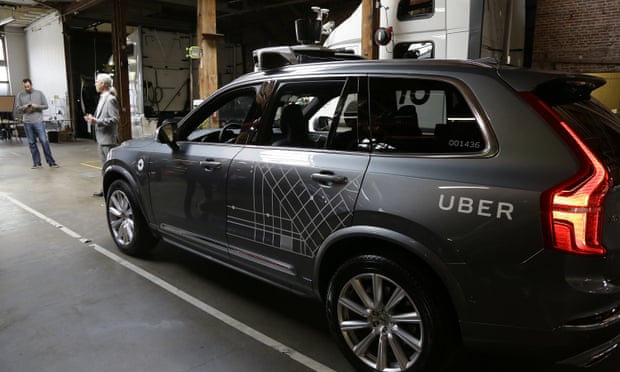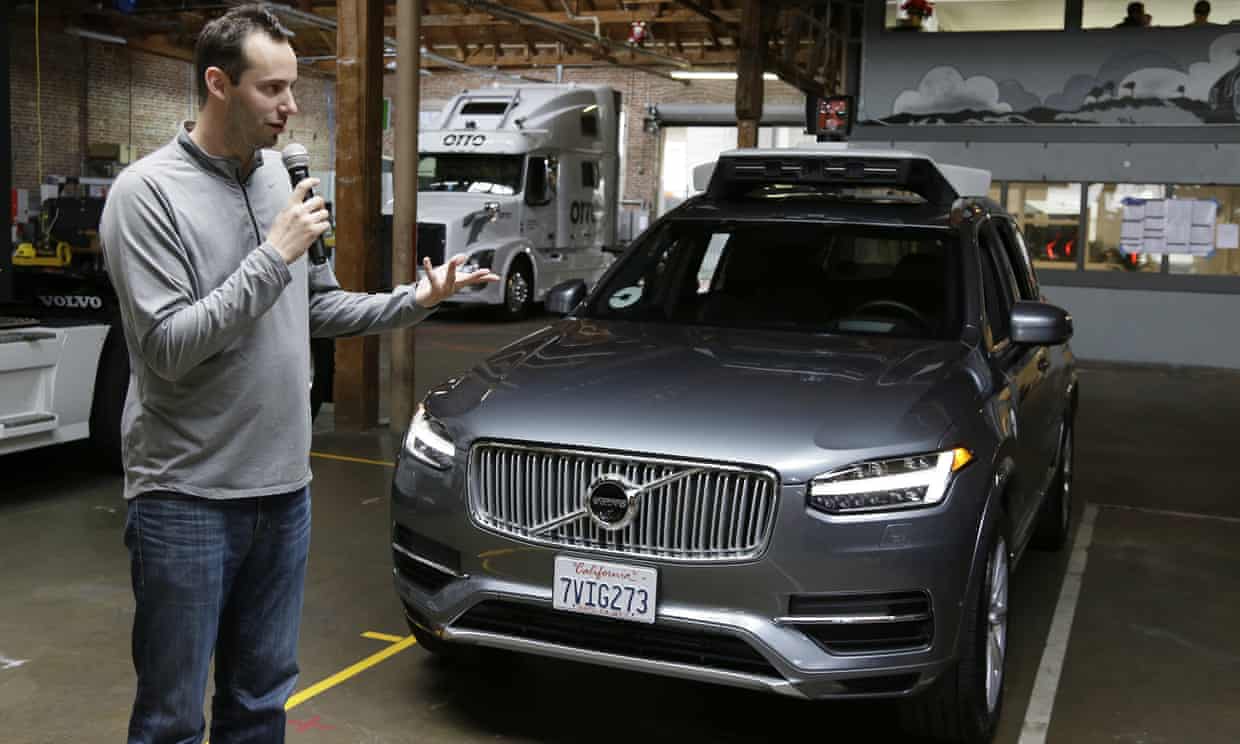Threat from the attorney general came shortly after Uber declared it would defy state regulations, a move the company said as ‘an important issue of principle’
 |
| Uber’s defiant stance appears to be setting the company on a collision course with California regulators in court. Photograph: Eric Risberg/AP |
California’s attorney general Kamala Harris on Friday
threatened legal action against the ride-sharing tech company Uber unless it
“immediately” removes its self-driving from the roads in San Francisco.
The threat from the office of the outgoing attorney general was
contained in a letter released to the public Friday shortly after Uber declared
it would defy state regulations, a move the company said was “an important
issue of principle”.
Twenty companies have been approved to test self-driving cars in
California, according to the DMV. Uber is not one of them, and the company is
refusing to abide by the same rules as its rivals – a defiant
move that critics argue shows disregard for the law and public safety.
Friday’s development portends a dramatic confrontation between
Uber and California state
officials, amid mounting anger in San Francisco at Uber’s refusal to abide by
the same rules as other companies.
Harris, a rising star in the Democratic party, was recently
elected to the US Senate. The letter from attorneys in her office said they
were acting on a request from California’s department of motor vehicles (DMV).
The DMV ordered Uber to either remove its self-driving cars from
the road or obtain a permit on Wednesday, the first day the company began a
trial of its self-driving taxis in San Francisco without permission.
The letter warns that if Uber does not remove the vehicles from
the road until it obtains a permit, the attorney general will “seek injunctive
and other appropriate relief”.
Earlier Friday, Uber made clear it had no intention of backing
down.
Anthony Levandowski, the head of Uber’s autonomous
vehicle program, said the rules do not apply to the company’s fleet of vehicles
because of its particular form of technology they are using.
“We cannot in good conscience sign up to regulation for
something we’re not doing,” he said.
“It’s an important issue of principle about when companies can
operate self-driving cars on the roads and the uneven application of statewide
rules across very similar types of technology.”
Levandowski added: “You don’t need a belt and
suspenders … if you’re wearing a dress.”
Uber’s defiant stance appears to be setting the company on a
collision course with California regulators in court.
“If Uber does not confirm immediately that it will stop its
launch and seek a testing permit, DMV will initiate legal action,” the DMV told
Uber in a letter this week.
The requirement to seek a testing permit for autonomous vehicles
does not apply to Uber’s cars, Levandowski argued, because the company’s cars
are not capable of operating without being controlled or monitored by a human
operator.
Levandowski compared Uber’s technology to Tesla’s autopilot
feature, saying: “It’s hard to understand why the DMV would seek to require
self-driving Ubers to get permits when it accepts that Tesla’s autopilot
technology does not need them.”
The first
known death caused by
a self-driving car occurred in May 2016, in a Tesla car using autopilot. Unlike
Uber, Tesla is one of the 20 companies that has been issued a permit to test
autonomous vehicles in California by the DMV.
Uber began using autonomous
vehicles to pick up fares in Pittsburgh in August. The city is home to Uber’s
self-driving car research facility, and the pilot program was met with
enthusiasm by local officials.
But in San Francisco, the pilot program has so far
been a public relations catastrophe.
Two self-driving Ubers were observed
running red lights on
Wednesday, the first day of the pilot. The company blamed the traffic violations
on “human error” and has suspended the drivers involved. However, the company
was not asked about the red light violations during a conference call with
reporters Friday and has not responded to follow-up questions seeking an
explanation.
The San Francisco police department’s traffic division was not
informed about Uber’s program until after it had begun, according to the San Francisco Examiner.
Brian Wiedenmeier, executive director of the San Francisco
Bicycle Coalition, also raised concerns about the vehicles in a blog post.
Wiedenmeier said that he had been invited to take a ride in a self-driving Uber
prior to the launch and came away with deep concerns about the vehicles’
ability to operate safely in a city where cars share the road with bicyclists.
“Those vehicles are not yet ready for our streets,” he wrote.
San Francisco mayor Ed Lee, who is generally a strong ally to
the city’s technology companies, “expressly warned” Uber CEO Travis Kalanick to
remove the cars from the road in a telephone call Friday, according to the
mayor’s press office.
“Uber is failing to be a respectful civic partner to the city of
San Francisco by choosing to put Uber’s self-interest before the safety of the
residents of their home town,” Ellen Canale, a spokeswoman for the mayor, said
in a statement.
In a blog post published Wednesday, Levandowski argued that
whether the company needed a permit from the state was a matter of “debate”,
adding that Uber had “looked at this issue carefully” and determined that a
permit was not necessary since their cars will still have a human driver
monitoring them.
Levandowski also appeared to argue that the state of California,
home to Silicon Valley, should amend its regulations to accommodate Uber,
noting that other states have regulations that “made clear that they are pro
technology”.
The conflict has exposed what critics say are the unethical
and illegal tactics that
the company has consistently used to grow its business. After the controversial
San Francisco launch, consumer
advocates in
California urged law enforcement to impound the self-driving cars and file
criminal charges against Kalanick for violating DMV requirements.
“It’s an outrageously irresponsible position,” said John M
Simpson, privacy project director with Consumer Watchdog. “The DMV should
immediately seek an injunction, and Uber’s executives should be prosecuted to
the fullest extent possible under the law.”
Source: https://www.theguardian.com/technology/2016/dec/16/uber-defies-california-self-driving-cars-san-francisco
